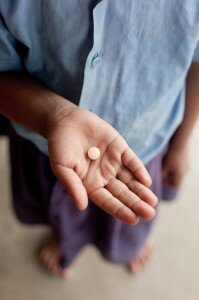By Simon Bush, Director of Neglected Tropical Diseases at Sightsavers
In 1947 when Sightsavers’ founder, Sir John Wilson, coined the phrase river blindness to describe the almost unpronounceable disease onchocerciasis, rife amongst Africa’s river-side communities, there was little choice for those living in areas where what we now call a neglected tropical disease (NTD) was endemic. Fear of being infected by the bite of the simulim fly, which was breeding in the rivers’ fast flowing waters and then going blind meant that villages were abandoned and with them, the rich fertile lands and people’s livelihoods.
Today, although the World Health Organization estimates that 120 million people1 are at risk of river blindness, there is hope.
For the last 25 years, drug distribution programmes to treat river blindness have been established across most endemic countries, and community-based distribution systems are used to ensure people receive an annual dose of ‘Mectizan’® (ivermectin)*. The drugs are donated by global pharmaceutical company Merck & Co. Inc. (known as MSD in the UK), and organizations like Sightsavers support the distribution.
However the real hope comes through evidence from the African Programme for Onchocerciasis Control (APOC), our key partner in fighting river blindness. It has found that when taken once or twice a year for 15 to 17 years ‘Mectizan’® can help control this debilitating NTD. This, at last, puts the end in sight!  Continue reading
Continue reading


 Baroness Helene Hayman, Recent Lord Speaker of the House of Lords, United Kingdom Parliament, asks the UK government about its commitment to NTDs.
Baroness Helene Hayman, Recent Lord Speaker of the House of Lords, United Kingdom Parliament, asks the UK government about its commitment to NTDs.